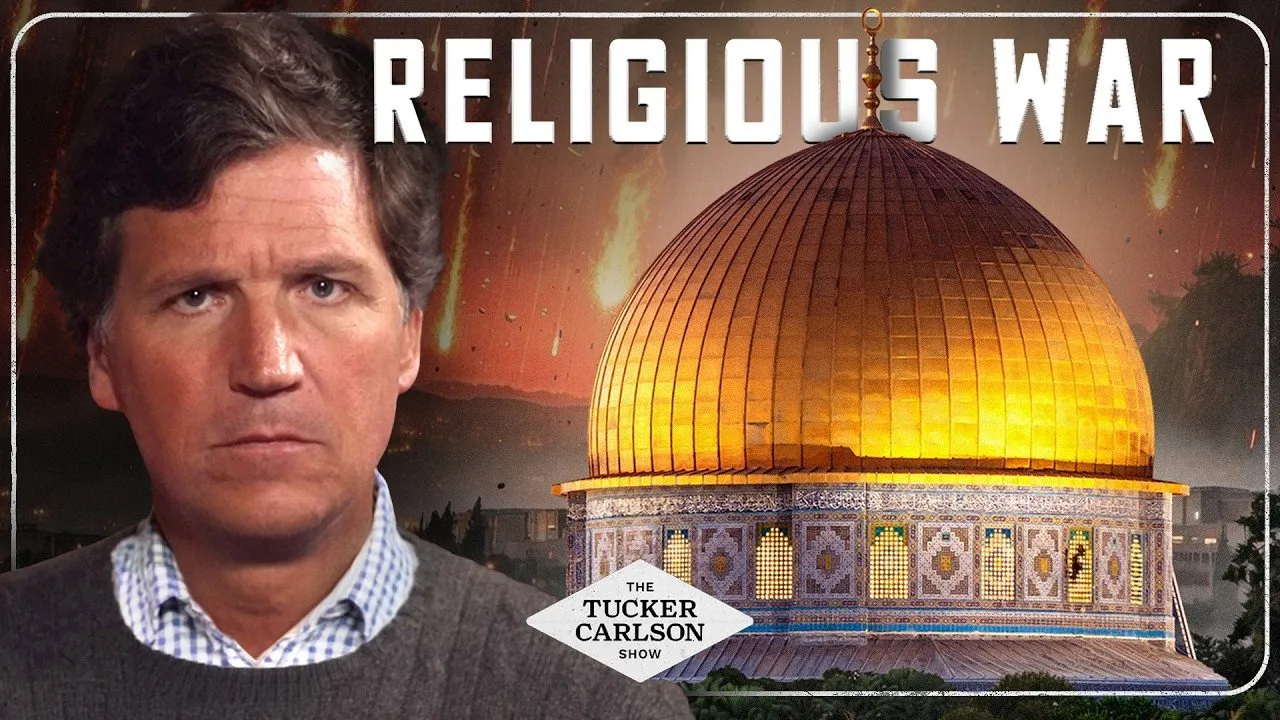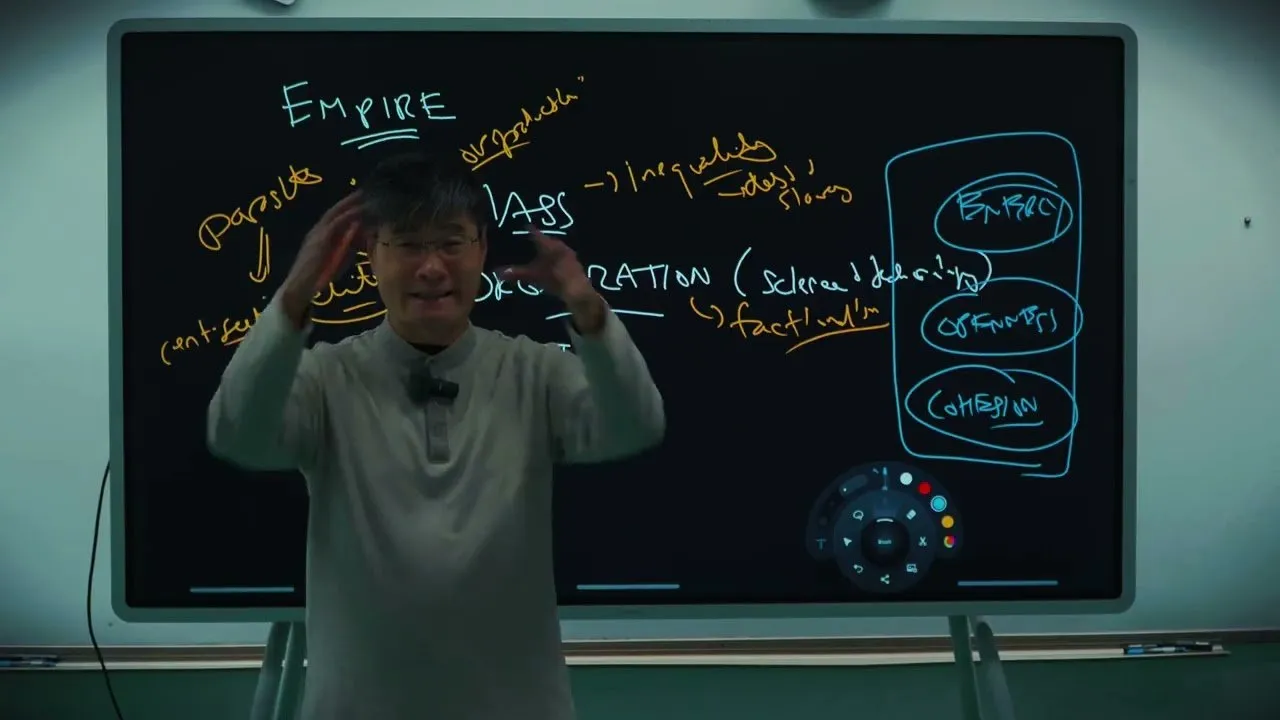Table of Contents
Vladislav Zubok, who grew up believing communism was humanity's future, explains how the Cold War was fundamentally a battle over which system could modernize the world better.
Timeline Overview
- 00:00–10:00 — Personal Cold War Experience: Zubok's upbringing as a young communist believer in the Soviet Union and his later education through American Cold War literature when Soviet sources were unavailable
- 10:00–20:00 — Ideological Foundations and Mutual Perceptions: How Soviet leaders viewed capitalism through Lenin's imperialism theory while Americans initially dismissed communist Russia as an impossible state until the Great Depression changed perspectives
- 20:00–30:00 — American Initiative and Kennan's Long Telegram: Discussion of George Kennan's influential containment strategy and how American internal insecurity about capitalism's future drove Cold War policies including the Marshall Plan
- 30:00–40:00 — Nuclear Weapons and Ideological Adaptation: How thermonuclear weapons forced Soviet leadership to reconcile Marxist-Leninist violent revolution theory with the reality of potential human extinction
- 40:00–50:00 — Non-Aligned Movement and Third World Experience: India's strategic balancing between superpowers and the emergence of the global capitalist system through institutions like the World Bank and IMF during the 1970s-80s
- 50:00–60:00 — US-China Comparison and Lessons: Why current tensions don't constitute a new Cold War and lessons from Soviet-American diplomacy for managing the Sino-American relationship
- 60:00–70:00 — Human Rights Movement Impact: How Soviet dissidents inspired American human rights activism that ultimately undermined détente and shifted ideological momentum toward the United States
- 70:00–78:00 — Soviet Collapse and Personal Transformation: Zubok's firsthand experience of identity collapse, economic chaos, and the rise of nationalism that followed Gorbachev's reforms and ultimate Soviet disintegration
Key Takeaways
- The Cold War was fundamentally about which system could modernize the world better - capitalism versus socialism - not merely geopolitical competition between great powers
- American internal insecurity about capitalism's future after the Great Depression drove much of the initial Cold War momentum and containment policies
- Nuclear weapons forced both sides to abandon violent revolutionary theories and pursue peaceful coexistence through arms control and détente
- The non-aligned movement successfully exploited Cold War tensions for development aid while avoiding ideological commitment to either superpower
- Current US-China tensions lack the existential ideological dimension that defined the Cold War since both nations operate within capitalist frameworks
- The American human rights movement gained strength from Soviet dissidents but ultimately helped delegitimize détente in favor of renewed confrontation
- Soviet collapse created an identity vacuum filled by nationalism and economic chaos that continues to influence Russian behavior today
- Gorbachev's inability to maintain reform momentum allowed Yeltsin to dismantle the Soviet Union from within rather than through external pressure
- Diplomatic engagement remained crucial even during the worst Cold War moments, providing lessons for managing contemporary great power competition
The Battle for Capitalism's Future
The Cold War emerged not as a simple great power competition but as an existential contest over which system could better modernize the world after capitalism's devastating crisis during the 1930s. For Europeans living through the aftermath of the Great Depression and World War II, communism appeared as a viable alternative to a discredited capitalist system that had produced economic collapse and global conflict.
- Capitalism's credibility crisis lasted from the 1929 crash through World War II, making communist modernization models attractive to devastated European populations seeking alternatives
- Soviet expansion occurred within this context of capitalism's perceived failure, with many Europeans genuinely considering communist party membership as a rational response to systemic breakdown
- American policymakers understood that restoring capitalism's legitimacy required not just economic recovery but demonstrating superior modernization capabilities compared to Soviet socialism
- The Marshall Plan represented more than economic aid - it constituted an ideological intervention to prove that liberal capitalism could deliver prosperity and stability more effectively than communist alternatives
- European recovery through American-backed capitalist reconstruction gradually answered the fundamental question about which system could modernize societies more successfully
- By the 1970s and 1980s, capitalism's superior performance in delivering living standards, technological advancement, and economic dynamism decisively resolved the modernization contest in favor of market economies
Nuclear Weapons Transformed Ideological Competition
The development of thermonuclear weapons fundamentally disrupted traditional Marxist-Leninist theory about capitalism's violent overthrow, forcing Soviet leadership to reconcile revolutionary ideology with the reality of potential human extinction. This ideological adaptation opened pathways to peaceful coexistence that ultimately enabled the Cold War's eventual resolution.
- Soviet nuclear physicists warned party leadership in 1954 that thermonuclear weapons made humanity's complete destruction possible, challenging canonical Marxist predictions about capitalism's inevitable collapse
- Communist theorists faced the contradiction that traditional revolutionary theory assumed violent overthrow of capitalism, but nuclear weapons made such violence potentially suicidal for all humanity
- Khrushchev's solution declared that socialist forces were strong enough to prevent imperialist wars while proceeding toward communist victory through peaceful competition rather than violent revolution
- This ideological innovation legitimized détente policies under Brezhnev, who prioritized peace over revolutionary confrontation while maintaining belief in capitalism's eventual peaceful defeat
- The nuclear revolution enabled arms control negotiations and diplomatic engagement that would have been impossible under traditional Marxist-Leninist revolutionary doctrine
- Without nuclear weapons forcing ideological adaptation toward peaceful coexistence, the Cold War might have remained a permanently irreconcilable confrontation with no pathway to resolution
Non-Aligned Movement Exploited Superpower Competition
Countries like India successfully navigated Cold War tensions by pursuing strategic non-alignment that extracted development assistance from both superpowers while avoiding ideological commitment to either capitalism or socialism. This third way approach lasted until the emergence of a dominant global capitalist system during the 1970s and 1980s.
- Nehru and first-generation Indian leaders combined socialist planning with selective engagement with both superpowers, seeking steel mills from Moscow while requesting American aid for other projects
- The non-aligned movement represented a deliberate strategy to benefit from Cold War competition without accepting subordination to either superpower's ideological or geopolitical agenda
- Countries pursuing non-alignment could experiment with mixed economic models combining state planning, private enterprise, and foreign investment according to their specific developmental needs and cultural preferences
- Export substitution strategies and economic nationalism flourished during the height of Cold War competition when both superpowers competed for influence through development assistance and technology transfer
- The emergence of the Washington Consensus and global capitalist institutions during the 1970s gradually eliminated space for genuine non-alignment as economic integration required acceptance of market-oriented policies
- Contemporary China's development model differs from Cold War patterns because it operates within global capitalist frameworks rather than promoting alternative ideological systems for international adoption
US-China Tensions Lack Cold War's Existential Character
Current American-Chinese competition represents a narrower geopolitical contest over hierarchy within the global capitalist system rather than the existential ideological struggle that defined the Cold War. The absence of competing modernization models makes contemporary tensions more manageable despite their significance.
- The Cold War involved fundamental disagreement about how societies should organize economic production, political participation, and social relationships, while US-China competition occurs within shared capitalist frameworks
- Chinese economic development operates through market mechanisms, private property, and international investment rather than promoting alternative socialist models for global adoption
- Both the United States and China participate in the same global economic institutions and trading relationships that characterize contemporary international capitalism
- Cultural and political differences between American democracy and Chinese authoritarianism matter but lack the systematic ideological challenge that Soviet socialism posed to capitalist modernization
- Future Chinese political evolution toward democratic institutions remains possible without fundamental changes to economic systems, unlike the Soviet model that required complete systemic transformation
- The geopolitical dimension focuses on leadership within existing international frameworks rather than replacing those frameworks with alternative organizational principles
Human Rights Movements Shifted Cold War Momentum
The emergence of American human rights activism during the 1970s, inspired by Soviet dissidents and Jewish emigration campaigns, fundamentally altered Cold War dynamics by providing moral legitimacy for American leadership while delegitimizing Soviet claims to represent progressive values worldwide.
- Soviet dissidents like Alexander Solzhenitsyn and Andrei Sakharov became household names in America, creating a narrative of "good Russians versus evil Russians" that resonated with American audiences
- Jewish emigration campaigns connected domestic American civil rights movements with international human rights causes, creating powerful political coalitions supporting confrontational policies toward the Soviet Union
- Human rights activism provided moral vocabulary for American leadership claims that transcended narrow geopolitical competition, positioning the United States as champion of universal values rather than merely capitalist interests
- The confluence of civil rights, feminist, environmental, and human rights movements created a broader progressive coalition that viewed Soviet authoritarianism as fundamentally incompatible with modern values
- Presidents Carter and Reagan recognized that human rights campaigns offered both moral authority and political advantage, allowing America to reclaim progressive leadership from Soviet anti-colonial and anti-racist rhetoric
- Soviet leadership proved unable to respond effectively to human rights challenges, remaining defensively focused on traditional economic and military competition while losing the ideological initiative
Soviet Collapse Created Identity Vacuum and Nationalism
The rapid disintegration of Soviet ideology and institutions created a profound identity crisis that produced economic chaos, moral cynicism, and ultimately resurgent Russian nationalism as people sought new sources of meaning and belonging after communism's comprehensive failure.
- Soviet television broadcasting information about superior Western living standards during Gorbachev's glasnost policies simultaneously destroyed remaining faith in communist promises and revealed the extent of systemic failure
- The collapse of ethical and ideological certainties coincided with rapid capitalist transition, creating a "wild east" mentality where any means of acquiring wealth appeared legitimate in the absence of moral constraints
- Domestic crime and economic violence flourished as social institutions disintegrated and traditional authorities lost credibility, while new capitalist practices lacked established regulatory frameworks
- Nationalism emerged as an alternative source of identity and meaning when communist ideology collapsed, initially focusing on grievances against Stalinist oppression but eventually supporting imperial ambitions
- The void left by communist ideology's failure remained unfilled by democratic institutions or civic nationalism, creating space for authoritarian leaders to exploit nationalist sentiment for political mobilization
- Contemporary Russian aggression reflects the continuing consequences of identity collapse and the failure to develop positive post-communist national identity based on democratic values rather than imperial domination
Gorbachev's Lost Momentum Enabled Soviet Disintegration
Mikhail Gorbachev's inability to maintain reform momentum after achieving initial liberalization allowed Boris Yeltsin to dismantle the Soviet Union from within, representing an unforced political collapse rather than inevitable economic or nationalist disintegration.
- Gorbachev's early reform period generated tremendous expectations and international admiration but slowed dramatically after 1988-1989 when continued leadership was most crucial for managing transformation
- The combination of economic dysfunction, nationalist movements, and political paralysis created opportunities for rivals like Yeltsin to seize initiative from a hesitant Gorbachev
- Russian nationalism under Yeltsin proved more destructive to Soviet unity than Baltic, Georgian, or Ukrainian independence movements, with Russia itself withdrawing from the union rather than being expelled
- Alternative scenarios involving gradual confederation or democratic federation remained possible if Gorbachev had maintained political momentum and responded more decisively to emerging challenges
- The suddenness of Soviet collapse created dangerous precedents about empire disintegration that contributed to subsequent instability in Eastern Europe and post-Soviet conflicts
- Historical parallels with rapid empire collapse after World War I suggest that managed transitions produce better outcomes than sudden disintegration, which creates power vacuums filled by extremist movements
Conclusion
Vladislav Zubok's analysis reveals the Cold War as fundamentally about competing visions of modernity rather than mere geopolitical rivalry, with capitalism ultimately proving superior at delivering prosperity and technological advancement. His personal experience growing up in the Soviet system and witnessing its collapse provides unique insights into how ideological certainties can rapidly disintegrate, creating dangerous vacuums filled by nationalism and authoritarianism. The contrast with contemporary US-China tensions highlights how today's competition occurs within shared capitalist frameworks rather than between alternative modernization models, making current conflicts more manageable despite their importance.
Practical Implications
- For Diplomatic Strategy: Historical Cold War experience demonstrates that engagement and communication remain essential even during intense rivalry, providing pathways for crisis management and eventual resolution
- For Understanding Russia: Current Russian behavior reflects unresolved identity issues from Soviet collapse rather than coherent ideological alternative to Western systems, suggesting different approaches to engagement
- For US-China Relations: Avoiding "falling domino" mentality that led to Vietnam War and Soviet overextension in Afghanistan could prevent unnecessary escalation of manageable geopolitical competition
- For Economic Policy: The Cold War's resolution through capitalist success rather than military victory suggests that economic competitiveness matters more than arms races for long-term strategic outcomes
- For International Development: Non-aligned movement's success in extracting benefits from superpower competition offers lessons for contemporary middle powers navigating great power rivalry
- For Historical Education: Understanding the Cold War's ideological dimension helps distinguish between existential conflicts requiring total commitment and manageable competition between nations sharing fundamental systems





